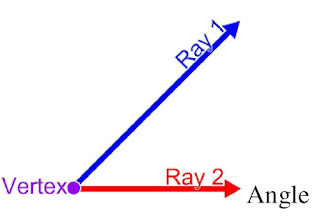Lesson Planning of Angles Subject Mathematics Grade 5th
Lesson Planning of Angles
Subject Mathematics
Grade 5th
Students` Learning Outcomes
- Recognize an angle through non-parallel lines.
- Draw an angle AOB with vertex (O) and arrows OA and OB.
- Recognize notation <AOB.
Information for Teachers
- A line has no beginning point or end point. Imagine it continuing indefinitely in both directions.
- We can illustrate the point by drawing little arrows on both ends.
- A line segment has a beginning point and an end point.
- A ray has a beginning point but no end point.
- Think of the sun`s rays: they start from the sun and go on forever…
- What is an angle?
- Many people think that an angle is some kind of slanted line. But in mathematics an angle is made up from two rays that have the same beginning point. That point is called the vertex and the two rays are called the sides of the angle.
- While naming an angle we put the vertex name
always at the middle and the symbol of the angle < or ^
- A line, a line segment, a ray, an angle
Material / Resources
Writing board, chalk / marker, duster, two
pencils, geometry box, textbook
Introduction
Activity 1
- Do you know the word ankle, the bend between the leg and the foot?
- With this ankle you can bend your foot in circular way.
- Do you know where your elbow is?
- You can bend your arm because of it.
- Ankle is to bend.
- Ask students to take out the dividers’ from their geometry boxes and see what makes the two arms bend?
- Introduce the center point as vertex and sides.
Activity 2
- Take two pencils and place them together and rotate one of them slowly and demonstrate the making of an angle as shown in figure 2.
- Ask students to take any two pencils and rotate them in the same way and identify the vertex and sides.
- Ask the students to look for bends or angles in their surroundings.
Development
Activity 1
- On the board draw two lines in V shape and label vertex, sides and angles.
- Label it with O, 1 and 2 and give your input about labeling it.
- Repeat the concept many times so that they understand (Read the book and key –points before going to class)
- Draw a few figures on the board and label it with different letter of the alphabets and ask students to name the angles like <AOB.
Sum up / Conclusion
- Conclude the lesson
Assessment
- Many more questions can be given in the form of worksheet or they can be written on the board.
- How many vertices are of this figure?
- How many rays are there in this figure?
- What is the common point of the two rays?
- Which point is taken at the middle while naming an angle?
- Name the angle.
Follow up




















Comments
Post a Comment